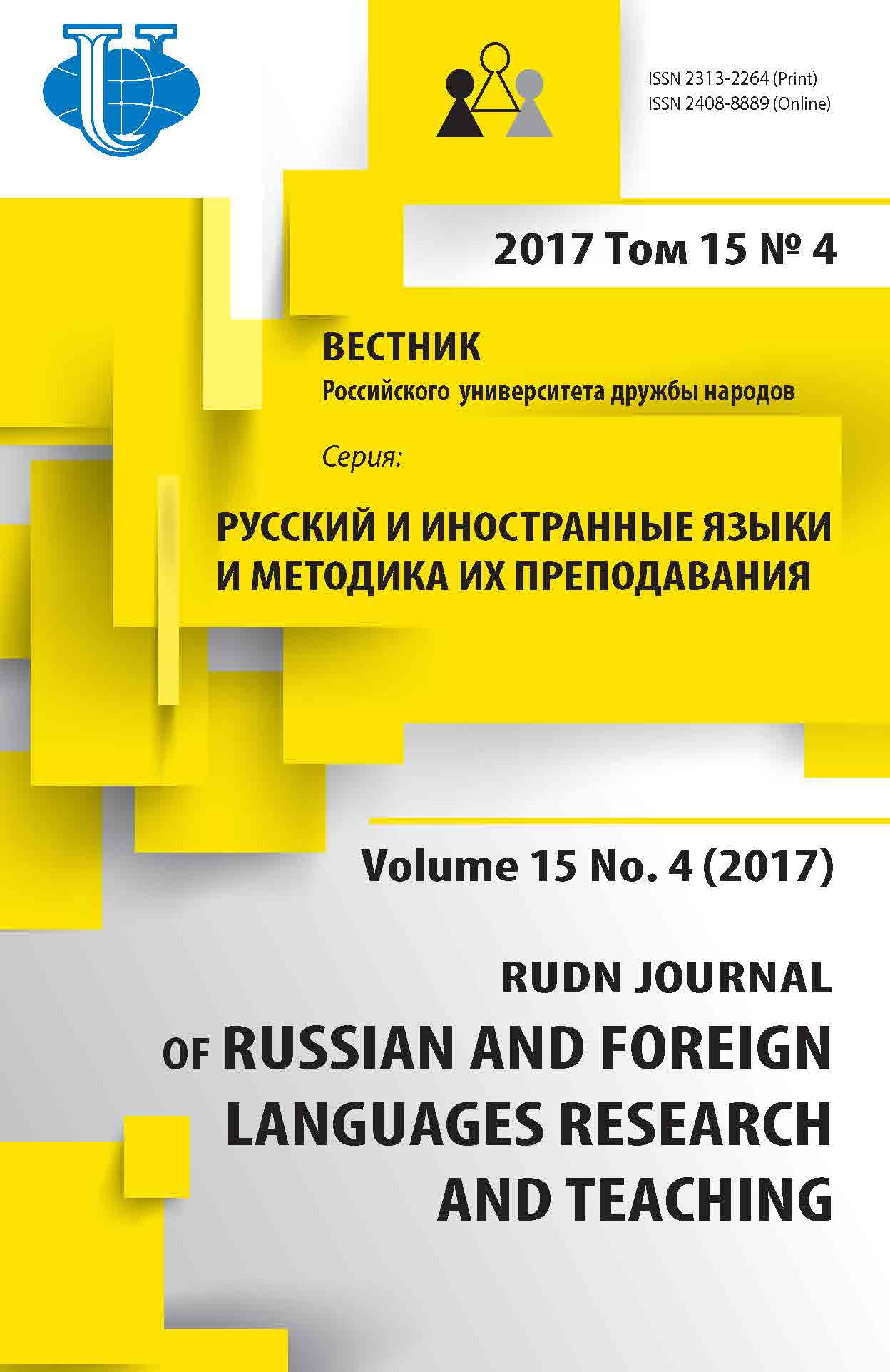THE “WAR” CONCEPT IN MODERN ENGLISH
- Authors: Golubenko EA1
-
Affiliations:
- Federal State-Owned Budgetary Establishment “The 3rd Central Research Institute of the Ministry of Defense of the Russian Federation”
- Issue: Vol 15, No 4 (2017)
- Pages: 447-457
- Section: Articles
- URL: https://journals.rudn.ru/russian-language-studies/article/view/17448
- DOI: https://doi.org/10.22363/2313-2264-2017-15-4-447-457
- ID: 17448
Cite item
Full Text
Abstract
At the beginning of the 21st century international relations and geopolitical situation have dramatically changed in the world. As a result, a variety of misunderstandings are increasing in the course of cooperation between the armed forces of different countries. There is a risk that people of different worldviews may interpret certain military notions (in particular the linguocultural concept “war”) otherwise. Subjective definitions and many options of understanding of the same concept in different languages, as a rule, give rise to ambiguity in interpretation, and as a consequence, the debate among scientists and the lack of a clear equivalent. The solution of this complex problem of ambiguity must be sought in the etymology of the linguocultural concept «war» and its lexical field.
About the authors
E A Golubenko
Federal State-Owned Budgetary Establishment “The 3rd Central Research Institute of the Ministry of Defense of the Russian Federation”
Author for correspondence.
Email: selenagol@rambler.ru
Golubenko Elena Aleksandrovna, Junior researcher, 13 th research division, Research Center (automotive vehicles) of the Federal State-Owned Budgetary Establishment “The 3 rd Central Research Institute of the Ministry of Defense of the Russian Federation”.
Krasnaya str., 85, Bronnitsy, Moscow region, Russia, 140170References
- Bolotina, A.Y. (2005). English-Russian Medical Dictionary. Moscow: RUSSO Publ. (In Russ).
- Bowyer, R. (2007). Dictionary of military terms. Third edition. A&C Black. London.
- BBC — iWonder — Sir Winston Churchill: The greatest Briton? Retrieved July 5 from: www.bbc.co.uk/ timelines/z363gk7
- Burnside A. Civil War Trust. Retrieved July 5 from: https://www.civilwar.org/about/contact
- Clausewitz, C. (2012). Printsipy vedeniya voiny [Principles of warfare]. L.A. Igorevskogo (translation from English). Moscow: Tsentrpoligraf Publ. (In Russ).
- Cold War: Causes, Facts, & Summary. Retrieved August 5 from: https://www.britannica.com/event/Cold-War
- Demetskaya, V.V. (October 18—20, 2007). Adaptatsiya v perevode: teoreticheskii aspect [Adaptation in translation: the theoretical aspect]. Abstracts of the IX International Scientific Conference on Translation Studies “Fedorov Readings” (pp. 25—26). Saint Petersburg: Faculty of Philology and Arts, St. Petersburg State University Publ. (In Russ).
- Desert Shield Desert Storm — U.S. Army Reserve. Retrieved July 11 from: www.usar.army.mil/About../ Desert-Shield-Desert-Storm/
- Desyat factov o vojne vo Vjetname.Voenno-istoricheskij portal warspot.ru [10 facts about the war in Vietnam. Military-Historical Portal warspot.ru]. Retrieved July 6 from: http://warspot.ru
- Dickson, P. (2003). War Slang: American Fighting Words & Phrases Since the Civil War. Brassey’s, Inc.
- Dukalskaya, I.V. (2009). Semanticheskie i pragmaticheskie kharakteristiki anglijskogo linvokulturnogo koda «artefacty» [Semantic and pragmatic characteristics of the English lingvocultural code “artifacts”]. [Author’s abstr. cand. philol. diss.]. Samara. (In Russ).
- Funk, W. (1950). Word origins and their romantic stories. New York: Funk & Wagnalls, Cop.
- Inghilleri, M. (2012). Interpreting justice: ethics, politics and language (routledge advances in translation and interpreting studies). Routledge: Taylor&Francis.
- Jackson, M.A. (1895). Memoirs of Stonewall Jackson by his widow, Mary Anna Jackson. Louisville, Ky., The Prentice press, Courier-Journal job printing company.
- Karasik, V.I. (2004). Yazykovoi krug: lichnost, koncepty, diskurs [Language Circle: Personality, Concepts, Discourse]. Moscow: Gnozis Publ. (In Russ).
- Korean War — Facts & Summary. Retrieved July 10 from: http://www.history.com/topics/korean-war
- Kubryakova, E.S., Demyakov, V.Z., Pankrats, Yu.G., & Luzina, L.G. (1997). A brief dictionary of cognitive terms. Мoscow: Filol. f-t MGU im. M.V. Lomonosova Publ. (In Russ).
- Lerer, S. (2007). Inventing English: a Portable History of the Language. Columbia University Press: New-York.
- Operation Iraqi Freedom and Operation New Dawn Fast Facts — CNN. Retrieved July 10 from: http:// edition.cnn.com/2013/10/30/world/meast/operation-iraqi-freedom-and-operation-new-dawnfast-facts
- Operation Overlord — History Learning Site. Retrieved July 5 from: www.historylearningsite.co.uk/../ operation-overlord/
- Ruark, R.C. Retrieved July 11 from: http://www.robertruark.org/home.html
- Simpson, J. & Weiner, E. (2006). The Oxford English Dictionary. 20 Volume Set. Second Edition. A Clarendon Press Publication.
- Stepanov, Y.S. (2007). Kontsepty. Tonkaya plenka tsivilizatsii [Concepts. Delicate membrane of civilization]. Moscow: Yazyki slavyanskikh kultur Publ. (In Russ).
- Sudzilovskij, G.A. (1968). English-Russian Military Dictionary. Moscow: Voennoe izdatelstvo Ministerstva oborony SSSR Publ. (In Russ).
- Ziatdinova, G.I. (2009). Kontsept «Sugysh (Vojna)» v tatarskoj yazykovoj kartine mira [The concept “Sugysh (War)” in the Tatar language picture of the world]. [Author’s abstr. cand. filol. diss.]. Kazan. (In Russ).
Supplementary files














